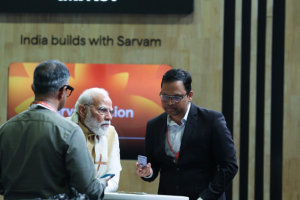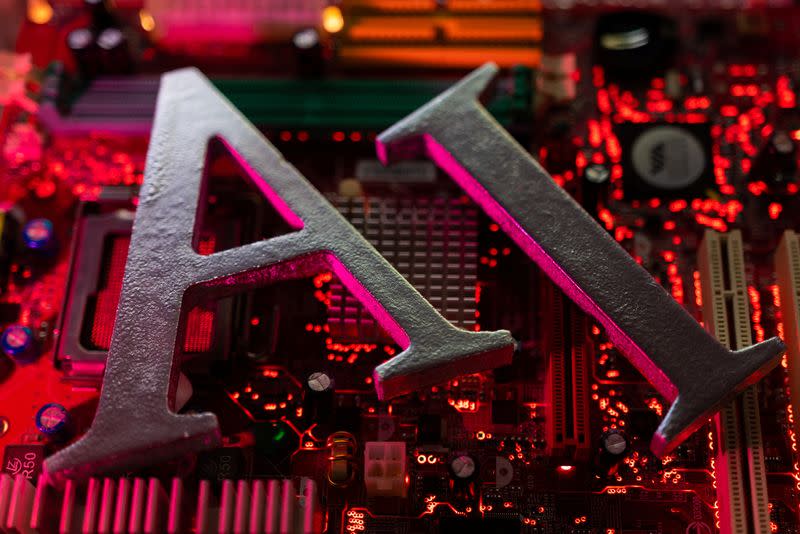In fresh trouble for smartphone-maker Apple and internet giant Alibaba in China, the administration of US President Donald Trump is reportedly unhappy about their tie-up to bring artificial intelligence to iPhones on the mainland.
Apple has, so far, been unable to roll out its AI services on devices purchased in China or for users based in the country due to strict regulations of the Xi Jinping government.
In February China’s Alibaba said it had tied up with Apple to bring AI to iPhones in China. “They want to use our AI to power their phones,” Alibaba’s chairman Joseph Tsai said at a public event in Dubai.
Also on AF: Nvidia to Build AI Supercomputer And New Office in Taiwan
That deal, however, has since been under scrutiny in the US, with the Trump Administration and several US lawmakers believing it would pose national security risks, the New York Times reported on Saturday.
The White House and congressional officials are concerned that the tie-up would help a Chinese firm improve its AI abilities and also make Apple more vulnerable to censorship and data-sharing laws of the authoritarian Chinese government.
They are also concerned that the tie-up between Apple and Alibaba would widen “the reach of Chinese chatbots with censorship limits,” NYT reported, citing three people familiar with the issue.
The report added that Trump Administration officials had voiced concerns about the deal directly to Apple executives.
Officials asked Apple executives about the terms of the deal, the extent of data sharing it would require with Alibaba and whether it would require the iPhone-maker to sign any legal commitments with Chinese regulators.
However, Apple’s executives were unable to answer most of those questions, NYT reported.
It added that Congressional officials were already “alarmed” by the fact that Apple had sought Chinese regulatory approval for the tie-up with Alibaba.
Concerns around Apple’s vulnerability to Chinese regulations stem, among other things, from Beijing’s increased oversight of mobile applications — rules that the iPhone-maker gave in to in 2023. That year, the Chinese government also ordered employees at some central government agencies to stop using Apple’s iPhones at work.
In April last year, Apple also removed WhatsApp and Threads from its App Store in China based on Beijing’s orders.
US officials considering larger restrictions
The NYT report also noted that the White House was concerned that the Apple-Alibaba deal would be a “problematic precedent” and could pave the way for more US firms to partner with Chinese companies, thereby helping them improve their AI models.
That concern has now led the White House to consider putting Chinese AI companies like Alibaba on a list that would prohibit them from doing business with American firms.
If Trump officials go through with implementing such — or stronger — restrictions, it would pose significant issues for Apple considering the company depends on Chinese suppliers for most of its products, and has only now begun small efforts to diversify.
Many of these suppliers are bound to have ties with other Chinese AI firms, considering the country is racing to take the lead in the technology. The AI boom in China has further intensified with the launch of DeepSeek earlier this year which shook up Silicon Valley.
It would also not be the first time that Apple would find itself stuck in the middle of the US-China rivalry. Aside from being forced to look for alternative production hubs, the company has in the past also had to abandon a deal with Chinese chip supplier YMTC.
It made the switch after the administration of the then US President Joe Biden added the Chinese state-funded chipmaker to its ‘unverified’ trade list.
Setback for both Apple and Alibaba
The current scrutiny, meanwhile, is bad news for both Apple and Alibaba.
For Apple it raises uncertainty around when — and if — it would be able to roll-out AI services in China. The company had reportedly hoped to tap into Alibaba’s significant amount of personal data on users’ shopping and payment habits.
A delay in AI-rollout will also further hit Apple’s already shrinking market share in China where it saw sales drop by 50% in March.
The company has already lost its position as the top seller in China’s massive smartphone market — the largest in the world. Early this year it slipped to fifth position amid competition from local players like Huawei, Xiaomi, Oppo and Vivo.
Chinese users have cited Apple’s lack of AI services as one of the reasons for not purchasing the company’s iPhones.
Meanwhile, Alibaba is facing its own challenges in China where shoppers, grappling with a prolonged property crisis and a cloudy economic outlook, have increasingly become cost-conscious.
The company is jostling for market share with e-commerce rivals like Pinduoduo and JD.com by providing deep discounts and rock-bottom prices, which in-turn has weighed on its revenue.
Within the AI space too, it faces tech challenges due to Washington’s chip export controls and increasing competition from rivals like DeepSeek and Tencent. If its tie-up with Apple can sustain US scrutiny, it could allow Alibaba to increase the market share of its AI model.
Alibaba’s Hong Kong-listed shares dived 3.4% on Monday, on concerns around the Apple tie-up. The company’s NYSE-listed ADR (BABA) also slipped more than 2% on opening.
Apple’s Nasdaq shares, meanwhile, slipped more than 2% as market opened on Monday.
- Vishakha Saxena
Also read:
Apple Sales in China Plunge 50%, Huawei Back on Top
Trump Tells Apple CEO ‘I Don’t Want You Building in India’
Apple Stock Soars as iPhones Airlifted From India ‘to Beat Tariffs’
Huawei Looks to Steal Apple’s Tech Crown With Tri-Fold Phone
Apple Offers Big iPhone Discounts in China Amid Sales Slump
China Tells State Officials to Stop Using iPhones at Work: WSJ
China’s Ban on iPhone Use Expands to Local and State Entities
Huawei’s HarmonyOS Set to Overtake Apple iOS in China – Fortune
China Orders Apple to Cut WhatsApp, Threads from App Store
























